I’ll go ahead and say it: Grave of the Fireflies, directed by Isao Takahata and animated by Studio Ghibli, is the greatest animated film ever made. It is the most haunting, heart-wrenching and tragic tale ever told on film, and that includes live-action films, as well. If you thought Mufasa’s death or Bambi losing her mum was too painful to watch, you haven’t felt true sorrow. But that’s not a fair comparison; the truth is, it is unfair to compare Grave of the Fireflies with the greatest work of Walt Disney or any animated film for that matter. This isn’t a children’s movie, it’s a devastating war film that has the power to make a grown man cry, sob and weep. I’m not ashamed in admitting Grave of the Fireflies brings tears to my eyes every single time I watch it.
The fact that it’s all based on a true story makes it all the more harrowing and disturbing. Don’t let my words scare you off, though. Grave of the Fireflies encapsulates so much humanity and beauty, I’m certain, without a reasonable doubt, that if you make it all the way to the end, it will make you a better person. I hope this is enough of an intro to make you watch this film. If you haven’t, I suggest returning to this point in my review after having done so, as I will explore some of the film’s deeper themes.
The film opens with a slap on the face. You see our main character sitting against a pillar in a train station. His clothes are torn, his body is covered in dirt, his frail arms rest flimsily next to him, his face lifeless against his chest. “September 21, 1945… that was the night I died.” How often does a film start with such a powerful prologue? Everything about this masterpiece is a rarity. The animation comes from a studio that constantly raises the benchmark of animation. In fact, each and every drawn shot is worthy of being framed against a wall. But what makes this film stand tall above anything remotely similar is the shocking subject matter. Grave of the Fireflies is set during the World War II, when the US was firebombing Japan in a desperate attempt to end the war.
The whole story is told through Seita’s perspective, and I mentioned before that this is based on a true story, which makes the opening death scene a cinematic metaphor. The real Seita, Akiyuki Nosaka, survived long enough to tell his story. Nosaka wrote the material this film was based on in the late 60s, and maybe the prologue symbolises the weight this tragic incident had on him’ nothing was probably ever the same again. Like Seita, Nosaka lost his little sister to the shattering effects of war. It is widely known that Nosaka wrote Grave of the Fireflies to come to terms with this loss. He blames himself for her death.
I say he lost his sister to the shattering effects of war, because war didn’t kill Setsuko, the effect it had on people did. This film is often regarded as an anti-war film, but that’s an inaccurate generalisation. We don’t witness any battles or soldiers marching into the frontlines of combat. The enemy flies above, but they’re not characterised in a villainous manner. War is a mere backdrop in this survival account, and the central theme here is how war temporarily changes who we are. It blinds us from all things human. It turns us into cruel selfish beasts, unsympathetic to the desperate needs of others. The kindness and compassion in human souls evaporate into thin air the second we are communally put in a situation where it’s every man for himself. Priorities eclipse our minds, and the fear of regret blocks our thoughts from the reality that we’re all in this together. It is only together, and with the help of one another, that we can all survive through our darkest chapters without being cursed with future guilt, shame, and remorse.
This central theme is evident right from the opening shots. We see bystanders regard Seita’s death with no empathy whatsoever. Bodies are being looked upon like they’re nothing but garbage. “Disgusting.” – “These bums are a disgrace.” – “This one’s a goner too.” At first, these remarks may come across strange to the viewer, but when Takahata takes us through the journey, we understand the sad nature of this destination. We witness the gradual surge of selflessness in the people of a bombed village. It starts with their aunt. At first, she’s welcoming and caring. Soon enough, she is ripping them off, and cursing them. She constantly mocks and humiliates Seita. Tells him he should be going to school when the school has been burned down, that he should work when he’s only 14 years of age. Eventually, she’s depriving them from food, hiding and saving the food for her own family. We hear whispers of the siblings being a burden in their house, more mouths to feed. Seita, being the son of a general, decides to take his sister and leave their aunt’s house with his pride still intact.
The transformational effect of war is also manifested in the scenes where Seita seeks the help of a doctor. When he stands above the body of his bleeding mother, the doctors delivers the bad news showing genuine sadness in their inability to help. In a much later scene, Seita seeks the help of a doctor to save his sister from dying. The news delivery is cold, like death is inevitable. No medicine is needed, only food, so the doctor could lend a helping hand, but he wouldn’t; he has his own troubles to worry about. Seita yells in frustration, but to no avail.
Seita is reduced to a thief at one point, but the viewer forgives him, because we have experienced the harsh realities of the war’s aftermath. It makes me think of how many times people have looked down at poor people stealing bread, when we have no clue what has led them to arrive to such last resorts. Nevertheless, Seita is beat near an inch of his life. Setsuko sees his face all swollen, and asks him if she should get him a doctor. When Seita hears these words coming from his little sister, he breaks down. No kid should worry about seeing a doctor.
The only hope for humanity in this story exists in the innocence and kindness of their relationship. Children are uncorrupted by the ugly world we live in. The purity of their innocence is what makes the nature of evil incomprehensible to their minds. The older we get, the less innocent we become; we’re built that way to endure the harsh realities of life. There’s another scene where Seita breaks down for the same reasons. He sees Setsuko digging a grave for the fireflies that have lit up the darkness of their shelter the night before. As the fireflies are pushed into their graveyard, we see a mirroring shot of piles of bodies being dropped into a massive hole. “Mama is in a grave too. She told me. She said mama died and she’s in a grave now.” It’s just not right to hear such heavy words coming out of a child deprived of the joys of childhood.
There are many haunting images in this film, one of the most hard to watch ones is Setsuko sucking on marbles like they’re candy or playing with bowls of dirt like its rice. What follows next is perhaps the most heartbreaking scene in the film. The war has ended and Seita has managed to get his hands on some real food. He tries to feed his sister a watermelon, but she’s too tired to quench her thirst. Setsuko sleeps and we learn that she never woke up. Setsuko’s last words are, “Seita, thank you.” Even in her last moments, she shows the kindness, innocence, and gratitude absent in adults during those hard times.
Later on, we see the only scene that isn’t seen through the eyes of Seita. In a touching montage, the viewer sees how Setsuko spent her time in the shelter absent of her brother. Watching her play around the way any child would is plain and simply beautiful. At one point in the film, Setsuko looks up at Seita, her eyes a blink away from sending tears streaming down her cheeks. “Why do fireflies have to die so soon?” Seita has no answer, and neither do I. We see two fireflies dancing around; the two dancing lights fade out in the darkness.

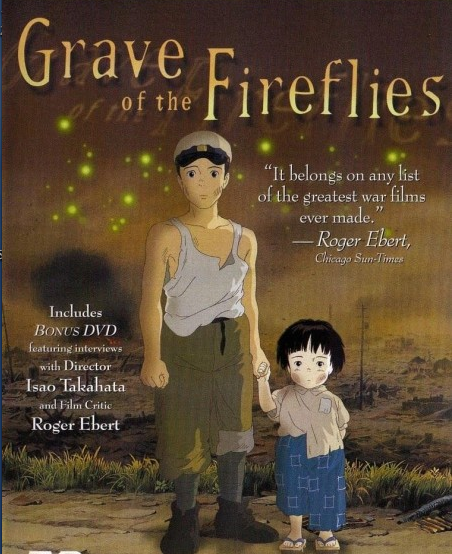
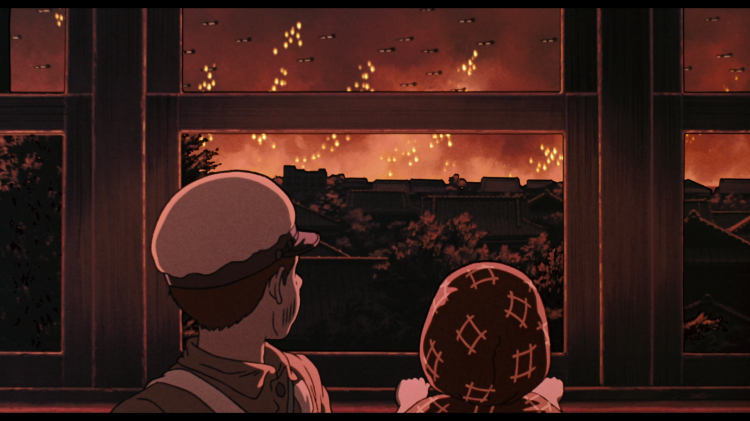
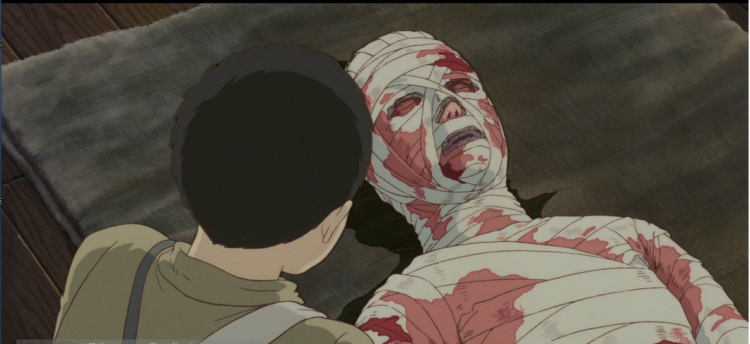
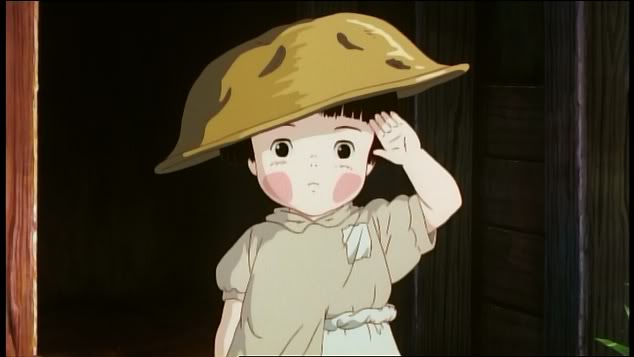
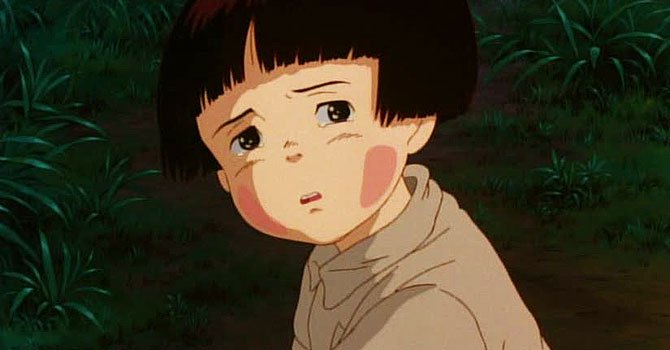
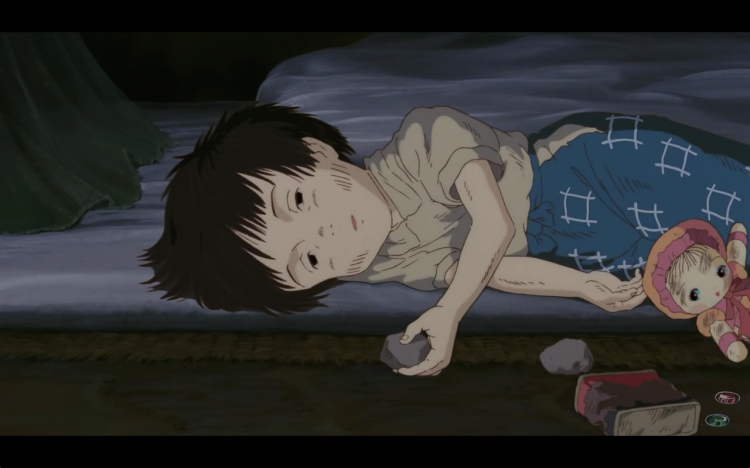
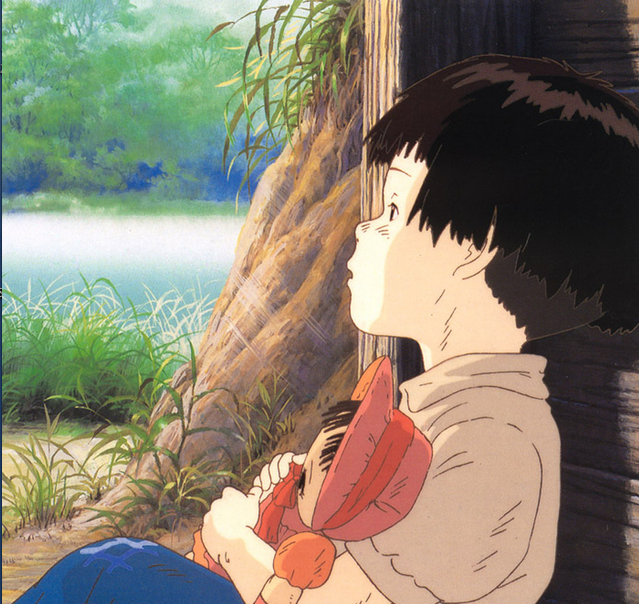
Reblogged this on Seni Coyote Seni….
LikeLike
Reblogged this on Making Euniverse.
LikeLike
Thanks for writing. I just finished this film and still cried while reading your post.
LikeLiked by 1 person
You forgot to put one of the best endings in any film in history.
The two of them in a bench, the city in the background, signifying I think, the end of war because the city looks likes it’s rebuilding.
“It’s time to sleep.”
“Okay.”
Best film ever.
LikeLike
so bitter, so sad and so full of the beauty of life and so full of little hidden messages. Still trying to convince my friends to watch this life changing Movie…
LikeLiked by 1 person
That’s the modern Tokyo in the background. Seita looks the audience in the eyes and then shifts his gaze to the gleaming city.
Take from that scene what you will. I sense him saying, “Don’t ever let this happen again.”
Unfortunately, people characterize the film as “anti-war”. It’s just war, exposed dispassionately for the audience to experience. If your reaction is “anti-“, well, that’s kind of obvious. Who could want it?
LikeLiked by 1 person
and by the way a great review it realy needs more hits on google
LikeLiked by 1 person
Yes I’m finish to watch and read this!!!!!!!
#SEITA
#heroism
LikeLiked by 1 person
This is the best review of this movie I’ve read. Is SO heart breaking… It has a very strong message, it is NOT JUST another sad film to cry (like a lot of people who hasn’t seen this movie actually thinks, and it actually makes you cry, but I mean that’s not the goal, you know), it is to THINK about our attitude when we see people in needing…and how it affects. And there are more things to think about…! Definitely one of the best movies I’ve ever seen. Thanks for your review!
LikeLiked by 1 person
what do you think the interpretation of the ending?
LikeLike
Well, to my opinion.. They live their life once again as a fireflies. Since most of the japan believe in reincarnation. They did reincarnate and became fireflies in the modern day of japan.
LikeLike
Very good analysis. But do you remember when Aunt changed her attitude?What is the only reason cause different fates between Aunt’s family and Seita’s family?
LikeLike
Beautiful review . I saw the film years ago but your review brought the movie back to life for me. Made my eyes moist.
LikeLike
can anyone explain me the two souls following the story characters? I mean… they finally sit on a bench and watch a modern but… what does that mean? They are stuck there as ghosts? They relive the same life again and again? Or is there any other meaning all-together???? please if someone can explain
LikeLike
modern city*
LikeLike
They’re looking at their past life.
LikeLike
I just finished watching the movie yesterday and it haunts me. This review is beautiful. It does justice to the movie.
LikeLike
A very heart breaking film for me. I just done watching it and I found your blog. While reading your analysis, I cried because it’s too sad and too heart breaking.
This is true:
“The older we get, the less innocent we become; we’re built that way to endure the harsh realities of life.”
thank you for your this blog. I cried again after watching the film.
LikeLike
Thank you for your lovely comment.
LikeLike
A very good analysis of a wonderful film. My understanding of the ghosts of the children is that it links to the Japanese Shinto religion. The ghosts represent the idea that our ancestors are always there, thus Seita and Setsuko can witness their own life as well as watch over the present. The end of the movie represents them watching over the modern city of Kobe.
LikeLike
YAASSS! This movie slayed. God bless America!
LikeLike
Amazing film. Especially the amazing ending.
Another thing i’ll point out is the incredible score/soundtrack to the film, the score couldn’t fit any better if it tried. Perfectly supplements the film.
LikeLike
If i was there at that time, i would : -share my food and supplies with them though i had little of food, at the same time teaching them how to grow some crops for food supplies. In the philosophy that if they die, i would die with them too. I will ask some seeds from farmers to work on them. Teaching Seita how to survive without stealing and to ensure the living of Setsuko. Shall also teach them about our Creator who lives in heaven. Who provides and live with us everyday. They will have a true hope of life and will not affected by the war situation. We’ll make our own world. The problem they had was no menthor to guide them on their difficult times. I’d be honoured to be their menthor as well as one survivor of war with them. If i allowed to live with them, i will make sure their happy ending for the children as they are on my own kids.This movie will change completely.
LikeLike